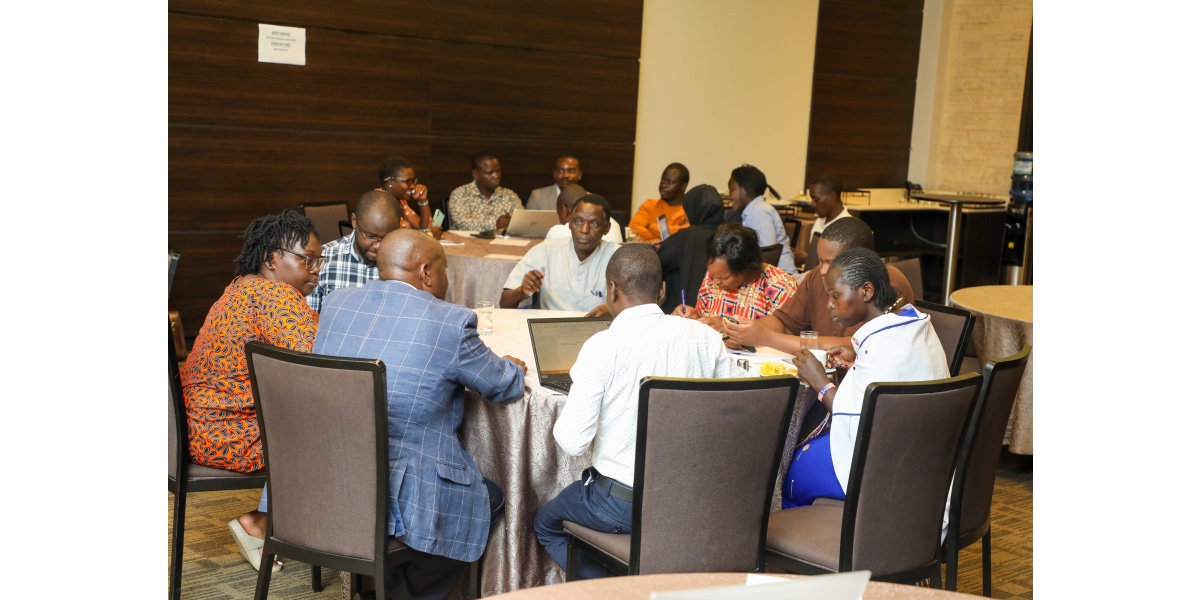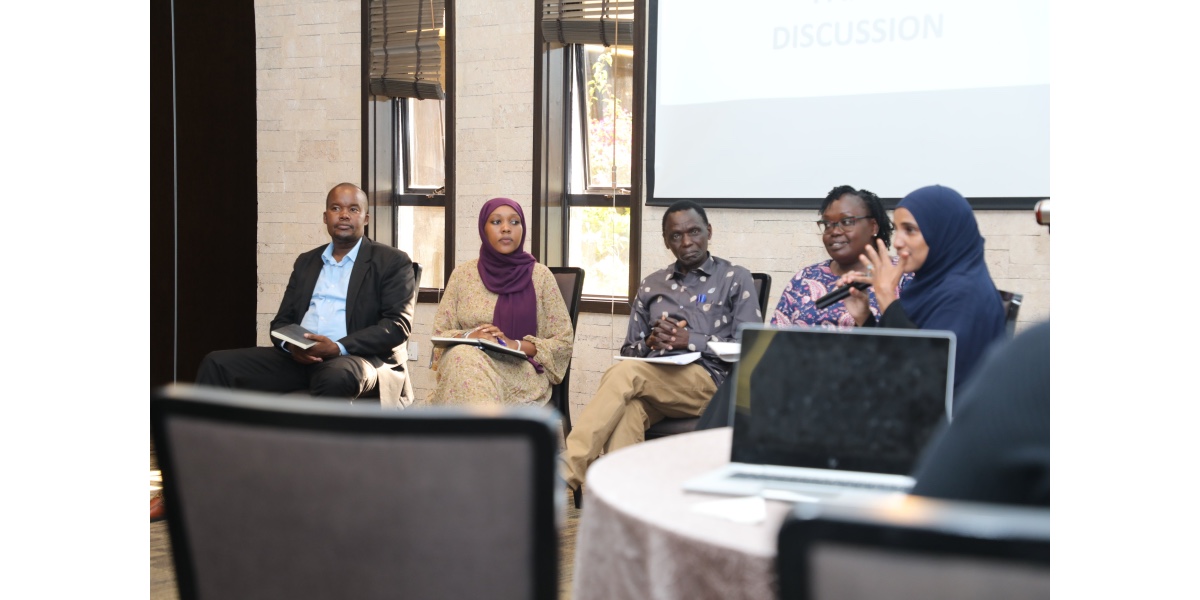Navigating carbon markets: implications for land rights and community empowerment in Kenya
In collaboration with Power Shift Africa, TMG Research organized a workshop in Nairobi to facilitate an exchange on the implications of carbon markets on land rights with stakeholders, including representatives from ‘affected’ communities.
by William Onura, Moritz Hauer, Washe Kazungu, and Frederike Klümper | 2024-06-07

In 2015, the 21st Conference of Parties (Cop 21) to the United Nations Framework Convention on Climate Change (UNFCCC) convened government officials, diplomats, and experts in climate change and environmental policy from nearly all countries worldwide in Paris, France. This gathering marked a concerted effort to confront the threats of climate change by agreeing to a landmark global accord: the Paris Agreement. The Agreement established a dual goal: limiting global warming to below 2°C above pre-industrial levels, with a concerted effort to pursue even more ambitious action to keep it below 1.5°C. Article 6 of the Agreement outlines mechanisms for international cooperation in achieving emissions reduction goals. It establishes a framework for voluntary collaboration between countries through Nationally Determined Contributions (NDCs), facilitating emissions trading, cooperative approaches, and the use of internationally transferred mitigation outcomes to advance global climate action. Additionally, NDCs also outline each country's strategies for adapting to the impacts of climate change.
In this context, carbon markets have emerged as a component of international efforts, offering a platform for countries to trade greenhouse gas emissions, aiming to drive progress towards the ambitious goals outlined in the Paris Agreement. By facilitating the exchange of emissions allowances and credits, carbon markets seek to incentivize emission reductions and promote sustainable practices. However, the effectiveness of these markets can vary as several challenges and complexities surround their implementation, including a lack of transparency, limited environmental integrity, market volatility, over-allocation of carbon credits, and climate justice concerns. These challenges extend far beyond environmental concerns with reported cases of land grabbing and non-disclosure of revenue accrued, particularly by certain intermediaries, brokers, and project developers. In addition, the local communities involved in carbon offset projects often have limited knowledge about these projects, including their initiation and overall process.
In Eastern Africa, Kenya has the largest Clean Development Mechanism (CDM) portfolio with hundreds of registered carbon credit activities, making it a significant player in the global carbon market. It is reported that Kenya is currently ranked 8th in the world, accounting for 12% of the world's nature-based solution credit issuances. In an auction in June 2023, 16 firms based in Saudi Arabia bought more than 2.2 million tons of carbon credits, 70% of which were generated from projects in Africa, including Kenya. Notable carbon market projects in Kenya include the Mikoko Pamoja, Upper Tana Nairobi, Vanga projects certified by Plan Vivo, the Northern Rangeland Trust project, and Burnstoves – a clean cookstove manufacturing.
Carbon market projects in Kenya have raised some concerns in the past, particularly regarding the land rights, which are crucial for maintaining the livelihoods, culture, and autonomy of local communities. One striking case occurred when the Ogiek people were evicted from their ancestral land for carbon credits in 2023. This eviction not only displaced the people but also stripped them of their rights to manage and benefit from their land. Furthermore, in June 2023, the governor of Kajiado County issued a notice revoking all carbon credit contracts that had been signed between private entities and local communities. This move came after the County Government realised that private entities were signing opaque agreements with community group ranches and conservancies to trade carbon credits. These cases demonstrated some of the potential impact on land rights, as free, prior, and informed consent was not obtained, and local communities were at risk of losing their power to effectively make decisions regarding the use of their land. As land use shifts towards carbon sequestration purposes, communities might be denied the opportunity to access and use land resources such as grass for livestock or fuelwood. As a results, land use conflicts can emerge.
As part of our work to strengthen legitimate tenure rights, TMG Research, in collaboration with Power Shift Africa, organised a workshop in Nairobi on the 21st and 22nd of March 2024, to facilitate an exchange on the implications of carbon markets on land rights with stakeholders, including representatives from ‘affected’ communities. Given the numerous carbon market projects, the Kenyan context provides a rich basis for discussing the implications of these projects on land rights. The workshop acknowledged the complex relationship between carbon markets and land rights in Kenyan communities and urged additional research, dialogue, and policy actions.
Unpacking the complexities
The workshop kicked off with poignant opening remarks by Power Shift Africa, emphasising the disproportionate burden borne by African nations in the face of global climate crisis. They urged a critical examination of underlying causes of land degradation and human rights infringements, particularly those related to land grabbing and denied access to livelihoods. They added that carbon markets, though publicly praised as a solution, have played a role in perpetuating inequalities and undermining local communities’ interests. As highlighted by Mohamed Adow, Director of Power Shift Africa, Kenya's pursuit of carbon credits is concerning. Discussing the significant compromises being made in pursuit of financial gain, he remarked,
Kenya is so desperate for money that we are willing to sacrifice our resources, such as land, our health, and the social well-being of the people, for carbon credits.
Power Shift Africa also emphasized the complexity of terminology in carbon markets, pointing out that this complexity is intentionally designed to benefit certain interests.

Participants discussing in groups at the workshop. Photo credit: Victor Odhiambo, Power Shift Africa, 21st March 2024
Legislative landscape
The National Environment Management Authority (NEMA), Kenya’s designated national authority for the CDM, and Kenya Land Alliance (KLA) delved into the legal frameworks governing carbon market projects. In response to reported issues of exploitation and skewed benefit-sharing arrangements, and in alignment with Article 6 of the Paris Agreement, Kenya has established domestic legislation as well as an institutional framework for carbon markets. In September 2023, the Climate Change Act, 2016 was amended to the Climate Change (Amendment) Act, 2023. The amendment introduced a new section in the law to guide the development and implementation of carbon markets. The legislation includes its subsidiary legislation, the Climate Change (Carbon Markets) Regulations which are yet to be gazetted. These Regulations aim to promote transparent, reliable, and effective mechanisms for the development and implementation of carbon markets in Kenya.
The participants criticised the policy and legal frameworks for prioritising economic gains over environmental protection, particularly for not having included a list of places and projects which should be exempt from carbon trading.
However, government officers present at the meeting also noted that a lack of regulation in carbon offset projects would present a greater threat to the issues being highlighted, including community livelihoods and land and tenure rights. As such, the government’s intention to establish a legal and institutional framework for carbon markets can also be viewed as a step in the right direction.
Voices from the affected communities
Representatives from the affected communities echoed concerns over land grabbing, inadequate compensation for local communities, the overall lack of transparency, and regulatory uncertainties. As pointed out by Edith Santiyian, Founder of Nalala Tree Foundation in Narok County, there have been reports of land grabbing associated with carbon market projects. She described the situation by saying,
Community land has been converted to conservancies, proceeds go to the government and other stakeholders, and communities take very little. The communities’ vulnerabilities result from limited or no land for cultivation, livestock being restricted from accessing traditional grazing areas, attacks by the rangers of these conservancies, human-wildlife conflicts, and lack of compensation despite the many promises. Furthermore, the loss and damage funds are not available for the community members employed in wanting conditions.
Without mentioning specific cases, Judy Kipkenda, a representative from the Koibatek Ogiek community, expressed concerns that carbon market projects prioritise economic gains over the social well-being of communities. Shampi Anna, a representative from Northern Vision in Northern Kenya, explained that the Northern Kenya Grassland Carbon Project raised concerns due to its alleged role in local community conflict and was suspended by Verra for non-compliance with standards.

Panellists during a panel discussion at the workshop. Photo credit: Victor Odhiambo, Power Shift Africa, 22nd March 2024
Recommendations
Recommendations put forward by the participants emphasise the urgent need for comprehensive action to safeguard communities’ rights and ensure equitable treatment within carbon markets in Kenya. Key proposals include the inventory and registration of all community lands to empower local communities in land management decision-making, the involvement of indigenous lawyers and civil society organisations (CSOs) as diverse voices in advocating for community rights, and the establishment of an equitable framework for valuing both community lands and carbon credits. Additionally, amendments to the Climate Change (Carbon Markets) Regulations to include clauses that provide for the protection of communities’ rights, ensure fair compensation, and address social and environmental impacts were proposed.
TMG Research and its partners continue to advocate for stakeholders to stay committed to promoting fair policies that prioritise the well-being and rights of local communities, ensuring that carbon market projects bring co-benefits for sustainable development rather than serving as a source of exploitation. Due to the diverse nature of carbon market projects, it is important to consider a range of factors when evaluating the impacts on local communities. In the case of land-based carbon offset projects, key considerations include the existing type of land tenure system, the carbon credit standard applied, the overall project scale, and the national legal framework. Evaluating these elements collectively enables an evidence-based approach to understanding potential impacts on local communities, particularly concerning their land tenure security.
 Urban Food FuturesFeb 09, 2026
Urban Food FuturesFeb 09, 2026Pushing the horizon: Urban farming and community-led innovation in Mukuru informal settlement
A small community-run greenhouse in Mukuru is offering insights into how controlled-environment agriculture can strengthen food security in urban environments under increasing pressure—and a look into the future of food systems in informal settlements.
Christian Sonntag, Emmanuel Atamba, Lumi Youm
 Land GovernanceDec 18, 2025
Land GovernanceDec 18, 2025Land tenure, women’s land rights, and resilience: Reflections from CRIC23 toward UNCCD COP17
Our experts discuss what the exchanges at CRIC23 highlighted and revealed about the role of secure and gender-equitable land tenure in the UNCCD's work ahead of the 2026 triple COP year.
Frederike Klümper, Washe Kazungu
 Urban Food FuturesDec 09, 2025
Urban Food FuturesDec 09, 2025The story of Mukuru's Urban Nutrition Hub
In Mukuru informal settlement, a safe haven for women has grown into the Urban Nutrition Hub, a multi-purpose space for nutrition education, training, and community development, demonstrating the potential of grassroots community-owned innovation..
Serah Kiragu-Wissler


